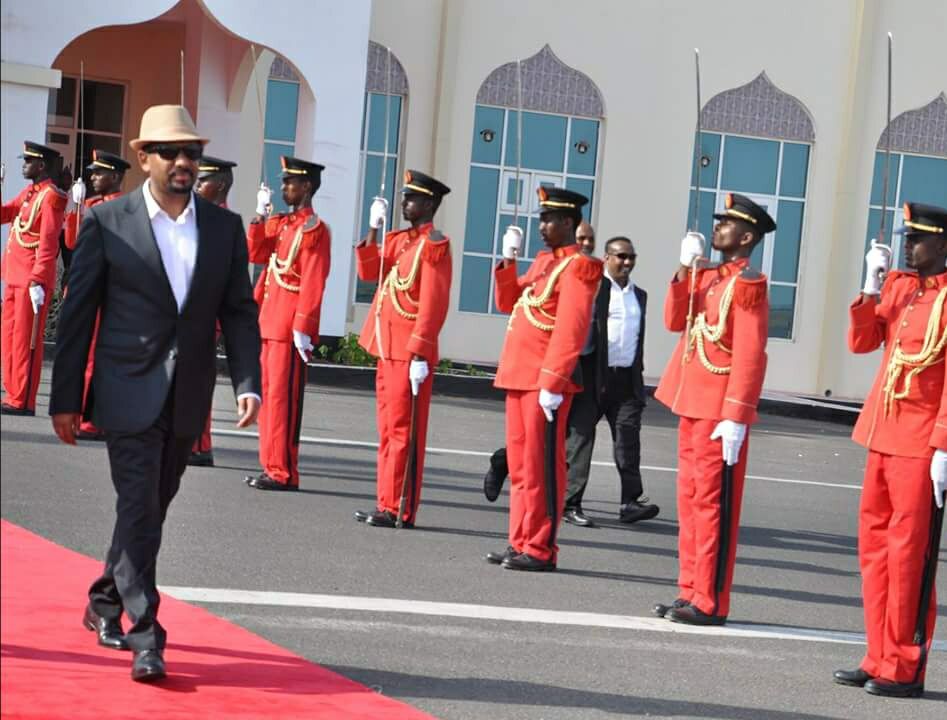
Nov 2 , 2019
By Habtamu Girma
Prime Minister Abiy Ahmed (PhD) clinched the chief executive position of the country a year and a half ago. He was a new face in the Ethiopian political scene. But he had developed his leadership qualities behind the scenes. Though he is relatively young, he already has more than 20 years of public service as a soldier, cybersecurity officer, bureaucrat and as a minister.
Abiy's inaugural speech in the Ethiopian parliament that was televised live to the public was well received. It was a reminder that he cleverly identified and understood the breadth and width of the problems Ethiopia was facing.
He identified the problem of state governance in Ethiopia as the cumulative effect of interventions focused on short-term solutions rather than policies that focus on healing the root causes. He located underutilization of resources and disguised unemployment in the realm of human capital. He underscored that project management issues in mega state projects are chronic problems that needed to be tackled right away.
Though this raised expectations, at the same time, it also sowed seeds of doubt whether Abiy would be capable and committed enough to address those problems. The 18 months of his rule has shown the leader is not only able to sort out problems but also committed to resolving them.
The first three months of his power were spent in trying to heal old wounds and narrow the polarisation in Ethiopian politics. He reached out to communities in all corners within Ethiopia and abroad. Because of these activities in the first few months of coming to power, he became very popular.
Many even dubbed him the messiah that is going to solve all the problems of the past - from poverty to internal displacement to mass communal violence that has taken the lives of many.
But as time passed, things began to change quickly. The applause turned into gross condemnation, where a sizable portion of the populace lebbed unfounded criticisms, if not a hostile attitude toward the leader. In many cases, the elite group has been blaming Abiy's administration without concrete evidence.
But while his popularity was beginning to decline at home and he was facing increasingly stern criticism, the a certain committee surprised everyone by awarding him the Nobel Peace Prize. That was mainly for his effort to bring peace between Eritrea and Ethiopia. His peace initiatives in other neighbouring countries were also recognised as well as the reforms he had initiated at home.
However, for the most part, most of his success is in foreign relations so far. The situation at home has proved to be more challenging. He seems to be more popular on the international scene than domestically.
The international community seems to be willing to give his governing philosophy, Medemer, a chance. They seem to be more willing to believe it can address the multitudes of problems Ethiopia is facing.
Abiy's governing principles are focused on the importance of optimising the potential of his country from its immense natural resources, a rising stockpile of human capital and rich social capital.
Medemeris based on the importance of resurrecting mindsets from all sources of negative energy: hate, animosity and revenge.
The steps that need to be taken going forward are actions toward healing the fractures of Ethiopian political culture. A typical feature of Ethiopian political culture is a lack of a history of resolving differences through dialogue, on the give and take principle. Sadly, in Ethiopia resolving political differences has been through political playoffs. Abiy has inherited this political culture. And his grand political project is to build a political system that heals the ills of this culture.
So far, key legal and institutional arrangements were made to achieve that. One such move was the refurbishment of the national Electoral board of Ethiopia in a way that better insulates it from political interference. The National Reconciliation Commission has also been formed, aimed at addressing the discontent some groups feel from past injustice.
Of course, there are many challenges remaining that Abiy has inherited from the past. All these problems are not going to be solved overnight. But it has to be started somewhere, and he has started that journey.
The world seems to have understood this and wants to encourage it further. That explains the awarding of the Nobel Peace Prize. The Prize is not just a personal reward for the Ethiopian premier. It also gives hope that every one of us that believe in love, peace and reconciliation have a place in today's turbulent times when leaders in all corners speak ill of those essential values of humanity.
For Ethiopians though, it seems like there is a reluctance to appreciate the achievements of their leader. The vocal critics of Abiy often raise the prevailing instabilities in different parts of the country. But it is unfortunate that they fail to see that those problems are results of a political decay accumulated in the past three decades.
My message to fellow Ethiopians is that while it is right to be vigilant, so Abiy may not get out of his list of promises, we have to understand mistakes are inevitable in the process of any work and give him a chance. Ethiopians have to stand with the Prime Minister to minimise the mistakes and maximise the benefits of the process of change for which we are all desperate. Let us not look at Abiy, but let us look at where he is looking.
PUBLISHED ON
Nov 02,2019 [ VOL
20 , NO
1018]


Fineline | Dec 14,2019

Viewpoints | Feb 13,2021

Viewpoints | Sep 10,2021

Fineline | Mar 16,2019

View From Arada | May 04,2019

Photo Gallery | 176631 Views | May 06,2019

Photo Gallery | 166842 Views | Apr 26,2019

Photo Gallery | 157384 Views | Oct 06,2021

My Opinion | 136927 Views | Aug 14,2021

Dec 22 , 2024 . By TIZITA SHEWAFERAW
Charged with transforming colossal state-owned enterprises into modern and competitiv...

Aug 18 , 2024 . By AKSAH ITALO
Although predictable Yonas Zerihun's job in the ride-hailing service is not immune to...

Jul 28 , 2024 . By TIZITA SHEWAFERAW
Unhabitual, perhaps too many, Samuel Gebreyohannes, 38, used to occasionally enjoy a couple of beers at breakfast. However, he recently swit...

Jul 13 , 2024 . By AKSAH ITALO
Investors who rely on tractors, trucks, and field vehicles for commuting, transporting commodities, and f...

Oct 18 , 2025
The political establishment, notably the ruling party and its top brass, has become p...

Oct 11 , 2025
Ladislas Farago, a roving Associated Press (AP) correspondent, arrived in Ethiopia in...

Oct 4 , 2025
Eyob Tekalegn (PhD) had been in the Governor's chair for only weeks when, on Septembe...

Sep 27 , 2025
Four years into an experiment with “shock therapy” in education, the national moo...

Oct 18 , 2025 . By NAHOM AYELE
In a sweeping reform that upends nearly a decade of uniform health insurance contribu...

A bill that could transform the nutritional state sits in a limbo, even as the countr...

Oct 18 , 2025 . By SURAFEL MULUGETA
A long-planned directive to curb carbon emissions from fossil-fuel-powered vehicles h...

Oct 18 , 2025 . By BEZAWIT HULUAGER
Transaction advisors working with companies that hold over a quarter of a billion Bir...